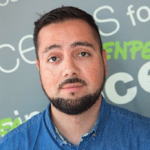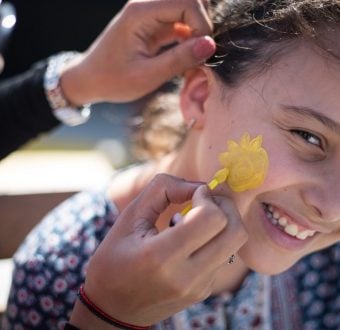The neglect of Puerto Rico by the U.S. after the devastating hurricane has highlighted the importance of communities taking the recovery into their own hands — and that’s what we saw first hand when we visited Puerto Rico.
Last week, Hannah Strange, Greenpeace’s Movement Support Hub Director, and I — Dario Parra, a social media specialist at Greenpeace — joined our partners from the Climate Justice Alliance (CJA) as part their Our Power Puerto Rico Campaign to support the people of Puerto Rico in their journey toward a just recovery.
Food Sovereignty Brigades
The campaign coordinated two Food Sovereignty Brigades during the time we were in Puerto Rico. Hosted by Organización Boricua, the brigades went to work side by side with local farmers to help rebuild small agro-ecological farms that were devastated by the hurricanes.
In total, the brigades worked on four farms across the island, fixing greenhouses, building compost structures, planting seeds and clearing fields. The group was made up of farmers, community members, and organizers from across the US representing Three Part Harmony Farm, UPROSE, Movement Generation, Black Dirt Collective, Via Campesina, Soil Generation, Farmworker Association of Florida, and more.
On the first day, we visited the brigades at their site in Orocovis, a community in the middle of the island where many families who depend on agriculture had much of their farms destroyed by the hurricane.

Dalma Cartagena, teacher, and students at Botijas Community School, Orocovis, Puerto Rico
The Botijas Agro-ecological Community School is a public school where students learn everything about agroecology — from the science behind it, to how to plant and harvest crops that they can consume and share. The teachers there are also clear that locally grown foods are a key part of a sustainable recovery from Hurricane Maria.
“Right now, we have an opportunity to lift Puerto Rico up in a just way, using our own resources and our own people.” – Dalma Cartagena, Teacher at Botijas Agro-ecological School in Orocovis, Puerto Rico
We're with #OrganizacionBoricua, @CJAOurPower & @UPROSE at the Botijas Community Agroecology School in Orocovis, Puerto Rico, as students work toward #FoodSovereignty for a #JustRecovery. #OurPowerPR pic.twitter.com/WtA4wPYgfr
— Greenpeace USA (@greenpeaceusa) January 23, 2018
Just recovery supplies
After a day in Orocovis, we spent two days in San Juan transferring just recovery supplies gathered by the Our Power Puerto Rico campaign from shipping containers into a warehouse storage space. In total there were five gigantic containers full of donations of solar power systems, water filtration supplies, agricultural tools, organic seeds, and fossil-fuel-free transportation like bikes and trailers. In the days that followed, those supplies began to be distributed to the rural farms and communities across the islands that are part of Organización Boricuá.
Prior to the hurricane, Puerto Rico imported about 85% of its food. After Maria, 80% of island’s crops were destroyed – making communities across the island even more dependent on expensive imported food. When Our Power Puerto Rico and Organización Boricuá reached out to farmers in the island to ask what they needed, many requested materials and equipment to rebuild and plant on the farms in order to have food sovereignty and have access to sustainable food.

Labor Brigade and Our Power Puerto Rico Delegation Move Supplies to Storage. Photos by Hannah Strange
Organizing against Disaster Capitalism
On Friday, Jan 26th, the University of Puerto Rico and PAReS (Profesores Autoconvocados en Resistencia Solidaria/Professors in Solidarity and Resistance), hosted a forum on Disaster Capitalism with writer and activist Naomi Klein, Elizabeth Yeampierre (Executive Director of UPROSE), Ruth Santiago from IDEBAJO (Initiative for the Eco-development of Bahía de Jobos), Eva Prado (El Frente Ciudadano por la Auditoría de la Deuda) and Mariolga Reyes from PAReS. The panel’s conversation analyzed how corporations are using the devastation of the hurricane as an opportunity for profit — the latest and maybe boldest examples being the government’s efforts to privatize Puerto Rico’s electricity and the recently announced push to create more charter schools.

Disaster Capitalism Forum at the University of Puerto Rico in San Juan
“[Climate justice] means ensuring a just transition toward food sovereignty, locally owned renewable energy, and racial justice…” – Elizabeth Yeampierre, Executive Director of UPROSE
On our last day in Puerto Rico, we drove to the south of the island, to Mariana, Humacao — in the southwest of the island — for a community meeting. Over 150 people from more than 60 organization got together for a day-long meeting, where they discussed and organized networks to work together and exercise their collective power to resist disaster capitalism and build a long-term recovery process for the island. It was a surreal and incredibly inspiring moment as communities from all over the island, many still struggling for basic resources, got together and built real community power to create a just recovery and a new vision for the future of Puerto Rico.
Today over 60 local community groups in Puerto Rico came together in a historic gathering to connect, share and plan a united vision for Puerto Rico. #JustRecovery #OurPowerPR #PAReS @UPROSE @IDEBAJO pic.twitter.com/W89TL3JjCE
— Our Power Campaign (@CJAOurPower) January 27, 2018
It’s been over a week since our visit to Puerto Rico, but we can’t get over the incredible stories, organizing, leadership, and love shown to us by the people of the island. There is a lot of work to do to rebuild the island, but the people of Puerto Rico and the solidarity from communities outside the island are continuing to work toward a just recovery. Throughout our visit, it was evident that the government still is not doing much to support many communities in the recovery — but what is also clear is that the people of Puerto Rico are building power, organizing and working toward a new vision that is controlled and created by them, not corporations or the government.
To keep up with Our Power Puerto Rico’s work in supporting a just recovery, visit their website and follow them on Twitter and Facebook.
[This blog was co-written by Hannah Strange, Movement Support Hub Director]



